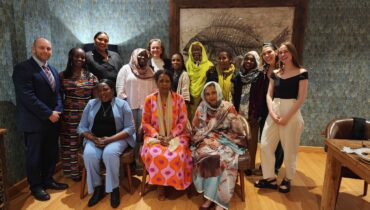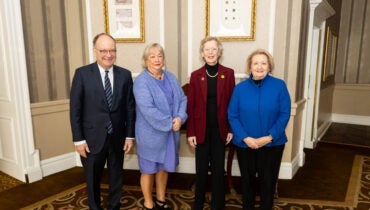President and CEO of the International Rescue Committee David Miliband visited Georgetown on April 27th to discuss the current challenges facing the humanitarian sector, and set forth his agenda for a new humanitarian system. Miliband focused his talk on need to transform the fragmented humanitarian mission-based sector into a better-functioning humanitarian system, where not only are there shared goals across international aid organizations, but also shared outcomes. He advocated for common methods of accountability and a common system of financing.
A system in which all the pieces work together would streamline the bureaucracy present in the current sector, Miliband said, and that to create such a humanitarian sector would require three things. First, humanitarian organizations should clarify what outcomes they are trying to achieve. Second, these organizations need to improve aid effectiveness. Third, organizations need to have common and transparent methods of financing for aid projects. Miliband also highlighted three priorities of the International Rescue Committee – improving children’s education in humanitarian settings, protecting women and children from domestic violence, and increasing family income, especially for refugees in urban locations – as they relate to this reimagined humanitarian system.
While Miliband expanded on these ideas, he said there needed to be solid accountability measures for humanitarian groups, specific and agreed-upon outcomes, and a quantifiable and clear idea of what constitutes success for a humanitarian mission. Miliband used education rates as an example to further his argument. Under Miliband’s plan for humanitarian reform, enrollment rates would no longer be sufficient data for measuring the success of an education project. Instead, measurable data – like attendance rates – would be required to prove the effectiveness of an educational program. Miliband also noted that the numbers of women being counseled would be inadequate as an indicator for whether women were actually safe from domestic violence. Funding needs to follow the evidence, Miliband said, and programs that fail to achieve agreed upon evidence standards should be phased out.
In his talk, Miliband also addressed the binary that exists between humanitarianism and development, noting that in reality, there is a great deal of overlap between these two categories. Miliband suggested that one should refer to humanitarian and development settings, because humanitarian organizations often practice development in humanitarian settings. Miliband also cautioned against conceiving of humanitarianism as separate from politics, and stated, “One of the dangers for humanitarians is we are locked outside of the foreign policy box.” He argued that there is a two-way causal effect between humanitarian crises and politics.
One of Miliband’s most timely arguments is that the current humanitarian sector must reform because it is currently ill-equipped to deal with the changing nature of humanitarian disasters. For example, he said that despite the fact that 60 percent of refugees live in urban areas worldwide, the current aid delivery model is still camp-based. This means that many refugees are not being efficiently or effectively reached. Miliband’s observation is especially relevant for a host country like Jordan, where just 20% of Syrian refugees live in camps. Another challenge facing the humanitarian sector is that a growing number of refugees and IDPs are living under non-state actors who are not recognized by and do not recognize the United Nations. Miliband said this is a particularly difficult to challenge to solve, but that part of the solution will involve working with a variety of local elites. A third modern-day challenge for the humanitarian sector is the necessity to overcome the assumption that poor and vulnerable groups are only found in poor and vulnerable countries. Miliband said that this erroneous assumption was still the guiding philosophy of many international aid organizations.
The talk ended with a question and answer section, in which School of Foreign Service Dean Joel Hellman and audience members asked Miliband a variety of questions. In response to a question on the risks involved in humanitarian assistance, Miliband first noted that most people displaced by conflict are not located in violent settings, and that aid organizations need to improve their effectiveness in peaceful areas. In regards to the violent locations, Miliband said that the high risk tolerance of humanitarian workers was “humbling,” and that it was rather the development sector that tended to be more risk averse—although humanitarian workers certainly do development work.
A common theme throughout the event was Miliband’s call for richer countries to do more to aid refugees. Miliband said that richer countries need to ally with poorer countries (who host the majority of refugees), give more in aid, and take the lead on humanitarian reform in order to better reach and assist those displaced by conflict. “Better aid, and not just more aid” was a guiding message throughout his talk, and Miliband expressed optimism that such a message would appeal to both the left and the right in U.S. politics.
You can read David Miliband’s full remarks here.
About the Author
Haydn Welch is a graduate research assistant with the Institute, and is a first year graduate student in the Arab Studies program at Georgetown. Haydn received a B.A. in Middle East studies from Swarthmore College in 2015. She studied Arabic in Amman, Jordan, where she conducted research for her undergraduate thesis on collective memory and national identity formation of Palestinian-Jordanians. At Georgetown, Haydn is developing her research in war and gender in Syria and Lebanon.


